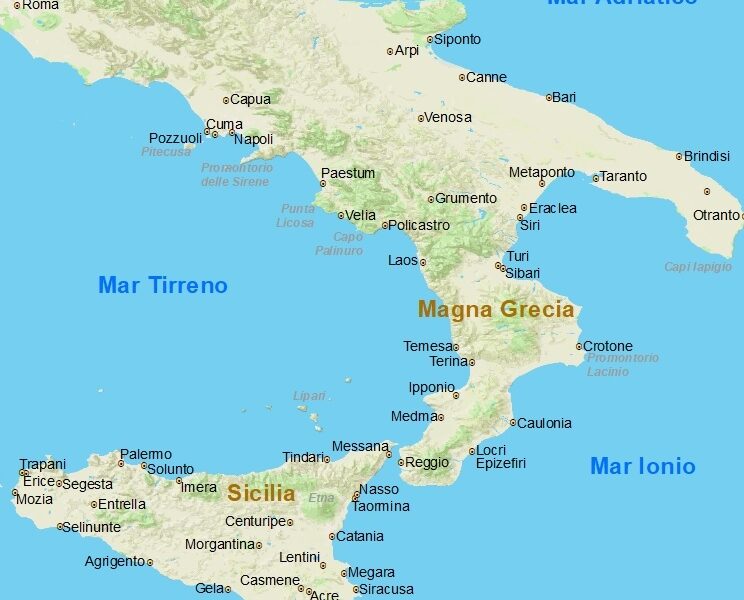Of extraordinary importance in the formation of southern Italian surnames, especially in Calabria, is the Greek contribution, a natural process following centuries of the Greek language in this region.
In alphabetical order:
Alampi (shiny), Amendolia (almond), Amuso (coarse, rough), Andidero (gift in return), Anghelone (messenger), Arcudi (small bear), Argurio (silver coin), Attinà (comb), Azzarà (fisherman);
Bambace (cotton), Barilla (cotton), Buccafurri (baked mouth);
Caccamo (great shepherds boiler), Caliciuri (good lord), Calogero (monaco), Calanna (good Anna), Caldi (good), Camini (furnace), Cananzi (my favourite), Cannatà (maker of chalk pots), Cannavca (gray), Cannistrà (maker of cauliflower), Cardìa (heart), Caridi (walnut), Cartellà (who makes or sells baskets), Cartolaro (official in the cadastral office), Catona (tent), Catricalà (sort of bird trap), Ceraso (cherry), Chiofalo (stubborn), Chilà (man with big lips), Chinigtra (hunter), Chiriaco (of the lord), Chiriatti (lord sarto), Chiricat (clerical), Cilea (belly), Codispoti (lord of the house), Comerci (tax, customs), Comi (senior Byzantine official), Condo (short), Crea (meat), Crisaphi (gold), Crisafi (gold), Crupi (cut), Cundari (short), Curatola (head of the herd), Curìa (barber); Curmaci (log), Cutella (who makes spoons), Cuzzocrea (made of ground meat);
Dascola (master), Dattola (finger);
Facciolà (who makes or sells head tissues), Fagà (who eats a lot), Falcomatà (cauldron), Fallà (sugheri forest), Fant (visible), Farace (engraving), Fasci (beverage), Filast bos (charm), Filocalo (beauty lover), Floccari (chioccia), Foti (light), Fotia (fire), Frega (well), Furnari (baker);
Galata (dairy), Galipce (difficult); Gerace (sparviero);
Jerino (crew);
Lacaria (walnut tree), Laganà (vegetable seller), Lagano (cabbage), Lanatà (who sells animal skins), Lardì (lardo), Lauria (small dogs), Leandro (saint), Liano (minute, lean), Licari (wolf), Lico (wolf), Logoteta (administrator);
Macrì (the long one), Macellari (large stream), Mallamace (gold), Mallamo (gold), Mammì (liver), , Mandaglio (small key), Manglaviti (Byzantine officer acting as bodyguard), Manti (fortuneteller), Marafioti (place of fennel), Megale (large), Melía (frassino), Melissari (beekeeper), Messineus (of Messina), Mezzotero (the major), Miraglia (admiral), Mirarchi (high military rank, general), Monarch (with a single testicle), Music Mi (musical);
Natoli (Eastern), Nistic (fasting);
Olive (lapse);
Pachì (fat), Pangallo (very good), Papasidero (Priest Isidoro), Pedace (child), Pedullà (butterfly), Pennestrì (reaper), Piria (red chest), Piromalli (who has red hair), Piscopo (bishop), Pitasi (hat), Polyphroni (of many years), Politan, (of the city), Politi (citizen), Practical molti (active), Privitera (priest), Prochilo (manual), Puja (earth, wind), Puterà (glass maker);
Rhodanus (red), Rodin, (red), Rodotà (full of roses), Romeo (from Rome), Rudi (melagrane);
Sbano (unshaved), Scalì (step), Schimizzi (ugly), Schir (hard), Scirt (curved), Scordo (garlic), Scutellà (who makes scallions), Sindona (sheet), Sismo (earthquake), Sorgona (manufacturer of big and tall roads), Spantener (shaven), Spinà (cuneo), Straticò (military chief);
Tambo (confused), Trimarchi (leader of a military squad), Tripepi (worthy of God), Tripodi (tripod), Triveri (poor);
Villari (manly member);
Zangari (footstool), Zema (brood), Zerbi (left handed), Zimmaro (goat), Z’inghinì (relative), Zuccala (potter).
Greek suffixes are quite common that say they are from one place. We have it like:
- this year: Romano, Serrano.
- eo: Cotroneus (of Croton), Messineus (of Messina), Romeo (of Rome).
- itano: Jeracitan (from Gerace), Locritano (from Locri), Militan (from Melito (RC) or Mileto (CZ) (? ), Reitan (from Reggio), Riggitano (from Reggios), Tarsitan (from Tarsia), Votano (from Bova).
- oti: Chiaravalloti (from Chiaravalle), Geracioti (from Gerace), Liparoti (from Lipari), Ringillacioti (from Squillace), Seminaroti (from Seminara).
- iti: Bruzzanites (from Bruzzano), Catanzarites (from Catanzaro), Mammolites (from Mammola), Palermites (from Palermo), Tavernites (from Taverna).
While these, as said, originating from a place the suffix - à (with tron accent, in Greek as) indicates the job of an ancestor:
Barillà (barrel manufacturer), Cutellà (making spoons), Laganà (vegetable seller), Scutellà (making bowls), Zuccalà (pot)
On the other hand, the surnames with an airy desinence are unclear Greek origin:
Cuppari, Gurnari, Licari, Muccari, Scullari, Siclari (bucket manufacturer), Sclapari. They seem to belong to an original, indigenous and independent Greece.
For seven or eight centuries the formation of Italian surnames seems to have reached a definite state.
[Source: Mimmo Co-Spouses]The Rohlfs, based on the rich dialectal materials that he had been collecting in the far south of Italy, supported their direct descendant from the colonization carried out by the Elleni emigrated at the time of Magna G Pray.
Among his works we remember:
· "Linguistic slaves in Magna Greece" (1934);
· "Dialectal dictionary of the three Calabria" (1932-39);
· "Etymological dictionary of Southern Greece" (1930), republished in 1964.
By Stato Magna Grecia - Due Sicilie.
READ MORE: March of the Dionisyan Cult in Crotone, Italy (VIDEO)


